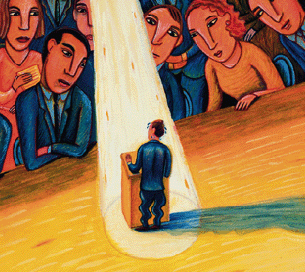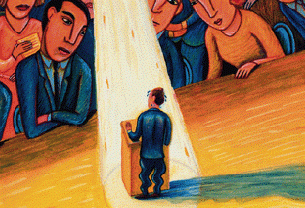 His acting career had barely begun when it was cut short by stage fright, a terror so great that he never even made it in front of the audience. But fear doesn’t have to rule your life. Martin McGrath looks at what can you do to fight back and how you can get help.
His acting career had barely begun when it was cut short by stage fright, a terror so great that he never even made it in front of the audience. But fear doesn’t have to rule your life. Martin McGrath looks at what can you do to fight back and how you can get help.
This young thespian’s career ended early. Aged about 12, the school play required him simply to walk on to the stage, announce that the king was coming, bow and stand at the back of the stage wrapped in a scratchy woollen blanket for five minutes.
How hard could that be?Rehearsals had been fine. “Here comes the king!” he’d bellowed to the empty gym hall and grinned.
Then came the night itself.
Was it the lights? Was it the strange burbling and rustling sounds coming from the audience as they settled into their seats? Was it the fear of making a mistake?
Whatever it was, come his cue the young thespian was huddled in the toilets determined that neither man nor beast would drag him onto the stage.
The teacher had seen it all before. “Here comes the king!” came the suspiciously older voice from off stage and the show went on.
Ever since falling at that first performing hurdle I’ve often found myself wondering about stage fright. As I’ve got older I’ve gone on to speak to large audiences about all sorts of topics on a reasonably regular basis and actually enjoyed myself. I’ve been on television and radio and not panicked. But the idea of dressing up and reciting lines or playing a part on stage still makes my palms sweat even thinking about it.
Writing for the British Association for Performing Arts Medicine (BAPAM), Dr Sanchita Farruque offers some reassuring insight into stage fright: “It occurs especially, but not only, when performing for the first time though even well-established performers can suffer.”
At least I’m not alone!
Some level of excitement is necessary, the doctor reckons, to help us deliver a good performance but it is when that excitement tips over into stress and the stress becomes anxiety, that stage fright begins to manifest some of its many symptoms – sweating, a dry mouth, a racing heartbeat, heavy breathing, dizziness, a sickness in the stomach and a constant need for the toilet.
“There are a few ways of trying to reduce stage fright, but it may never completely go away,” Doctor Farruque writes. “Some people would say that a performer needs a certain amount of ‘nerves’ to perform well. What this means is that, as long as the energy feels more like excitement than dread, then it’s fine to have a little bit of anticipation. However, because this can be very hard to judge, it’s not always possible to control the excitement and stop yourself feeling afraid.”So what steps can you take to help you cope when stage fright threatens to ruin your performance? In extreme cases there are drugs that can help – beta blockers can slow the heart and help calm the nerves, or tranquillisers – but these are serious drugs with serious side-effects, are available only on prescription and should be used only as a last resort. And while the drugs may ameliorate the symptoms in the short term, they can’t solve the problem.
There are other, non drug-based ways of tackling stage fright that you can try first.
One that immediately appeals is eating foods that release the “happy hormone” serotonin – bananas or dark chocolate – while keeping well hydrated with water or non-alcoholic drinks. Sadly chocolate also contains caffeine, so too much could send your nerves racing again. Moderation, as it so often proves to be, is the key.
Other treatments recommended by Doctor Farruque sound less fun, but may well be more practical.
- PREPARE THOROUGHLY
Knowing your role or act inside out and well in advance can help prevent last-minute jitters. - START SMALL
Build up to a big performance with some small-scale or less important gigs to get you ready and build your confidence. - DISTRACT YOURSELF
Don’t sit and fret about what’s happening, find something to take your mind off the performance. - TAKE DEEP BREATHS
Breathing exercises can help you manage the adrenaline flowing through your body and bring calm. - TAKE PHYSICAL EXERCISE
Warm-ups can help distract you and help use up that adrenaline on something useful. - COMPLIMENTARY THERAPIES
Methods such as massage, meditation, yoga, Tai Chi, Pilates or the Alexander technique can all help you relax and distract you from your anxiety. - BITE YOUR TONGUE.
If you go on stage and your mouth dries, gently bite your tongue. It will encourage saliva flow. - COUNSELLING.
If none of the above seem to help, find a counsellor or therapist with experience of treating performance anxiety.
“There are many different causes of stage fright and different ways to deal with it,” Dr Farruque writes. “Being aware of and open about it is a good start. The more you share your fears, the less you will suffer alone. Get yourself the help that works for you and you should find that as you perform more and more, the effects of stage fright will become less stressful and you will be more able to cope.”
The advice may have come many decades too late to save my career as an actor, but it seems to make sense.
ABOUT BAPAM
The British Association for Performing Arts Medicine is a unique charity delivering specialist health support to performing artists.
- We run free, confidential health assessment clinics for professional, semi-pro and student performing artists. Clinics are provided by leading specialists in performing arts medicine who volunteer their time.
- We hold an online directory of healthcare practitioners who have special expertise in treating performing artists.
- We have a library of health information resources for performers.
If you suffer from stage fright – or if you want medical advice about any element of your life as a performer, you can contact BAPAM on 0845 602 0235, email clinic@bapam.org.uk or visit their website at www.bapam.org.uk.
